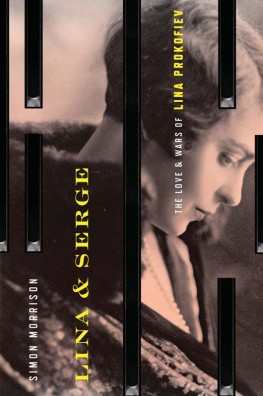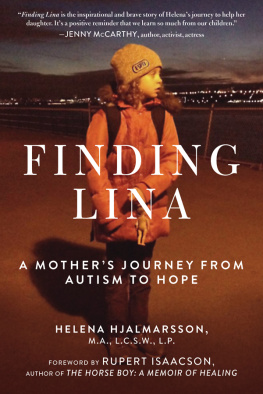Copyright 2013 by Simon Morrison
All rights reserved
For information about permission to reproduce selections from this book, write to Permissions, Houghton Mifflin Harcourt Publishing Company, 215 Park Avenue South, New York, New York 10003.
www.hmhbooks.com
The Library of Congress has cataloged the print edition as follows:
Morrison, Simon Alexander, date.
Lina and Serge : the love and wars of Lina Prokofiev / Simon Morrison.
pages cm
ISBN 978-0-547-39131-1
1. Prokofiev, Lina, 18971989. 2. Sopranos (Singers)Biography. 3. Composers spousesBiography. 4. Prokofiev, Sergey, 18911953. I. Title.
ML420.P9753M67 2013
780'.922dc23
[B] 2012042185
eISBN 978-0-547-84413-8
v2.1117
For Serge Prokofiev Jr.
Introduction
A MONG THE FEW possessions to survive from Lina Prokofievs eight years in the Soviet gulag is a battered burlap sack. The makeshift purse is just large enough to hold the scores of the French, Italian, and Russian arias that the once-aspiring operatic soprano sang in prison and taught to other women in the barracks.
Among the pieces of remembered music was a song by Chopin called The Wish. It tells the tale of a woman so devoted to her beloved that if she were the sun, she would shine only for him, and if she were a bird, would sing for him alone. For Lina the song offered an escape into the memories of an earlier time; she had learned it long before. And in the extreme north of the Soviet Union where she was imprisoned, it spoke to the power of imagination in a place of mind-numbing barrenness.
The sacks twine handles wrap around two small wooden plates, one twice the size of the other, with the smaller set into a dented metal frame. Each plate bears her name LINA PROKOFIEV the letters etched into the wood and underscored in pencil. Since Lina did not have a conventional Russian patronymica middle name derived from the fathers first nameher captors assigned her one, also adding a feminine ending to her surname. She became known as Lina Ivanovna Prokofieva, her former self lost with her freedom but safe there in the sack.
Her initials, L. P., are stitched into the middle of each side, surrounded by crosshatches in red, yellow, orange, and gray. Having learned needlecraft in the camps, she labored hard over the embellishments that personalized her belongings. Save for a small dark stain at the bottom, the sack remains in excellent condition. Decades later, it ended up in the care of her older son, Svyatoslav.
Lina was born in Madrid, spent her youth in Brooklyn, studied singing in Paris, and sought to make a name for herself in Milan. She spoke the languages of all of these places as well as Russian, her mothers tongue. She married Serge Prokofiev, one of the great musical geniuses of his time, when she became pregnant by him in 1923, and together they traveled back to Stalins Soviet Union for the first time in 1927, as much anxious as excited. Serge had originally left Russia in 1918, before Stalins ascent to power, and Lina had not been within its borders since childhood. Soviet cultural officials sought to reclaim Serge for the socialist experiment, to lure the modernist phenomenon back to his modernizing homeland. The potential benefits of the trip were immense. Serge had been promised prestigious commissions, performances of works that had languished in the West, enthusiastic receptions, even a professorship with the Moscow Conservatoire. He pledgedhaughtily, condescendinglyto change the course of Soviet music.
The former Russian capital of St. Petersburg, called Leningrad at the time of the Prokofievs return, retained its palaces and estates, pastel faades, and frozen canals; it had not changed since Serges youth, and seeing it again, he was overcome. In contrast, the new capital of Moscow was undergoing shocking change. The skyline had been cleared of onion domes to make way for imposing utopian monuments to Soviet power; their foundations were still being poured. The city had its seductions but also a palpable darkness the Prokofievs chose mostly to ignore. Lina paid no attention to the telltale buzz on the phone in the Metropole Hotel, which signaled that the line was bugged, and banished thoughts of who might be listening on the other side of the thin door connecting their room to another. Told there might be microphones, Serge made a joke of cupping his hands and whispering into her ear in bed at night.
But success fostered self-delusion as Serge received repeated standing ovations and spectacular reviews as a pianist in Soviet concert halls. He unleashed an inferno at the keyboard, playing his Third Piano Concerto with a conductorless ensemble in Moscowhis forearms strong enough to crack apart the soundboard, his immense hands generating vast sonorities at earsplitting dynamics. Lina basked in the attention lavished on the elegant couple at banquets given in their honor. Stalinist cultural officials could not countenance Serges music yet recognized its power, its potential as a weapon of propaganda. Lina was complimented on her singingcalculated praise, of course, but appreciated nonethelessand told that if the couple returned to Moscow, as the Soviet government hoped they would, she could have the career that had eluded her in the West.
Serges subsequent trips to the Soviet Union were not as triumphant yet less obviously scripted, a better indication of what Soviet life might really be like for him, should he choose to stay. He turned crimson and bristled, in his three-piece tailored suit and multicolored leather shoes, when drab proletarian musicians attacked him for mocking Soviet economic progress in one of his ballets, Le pas dacier (The Steel Step). Lina did not need to be present at the debate to know how her husband reacted to his criticsby reminding them, in staccato outbursts, of their trifling politics and his greater artistic concerns.
In Paris, where the couple then lived, Lina received invitations to soirees at the newly opened Soviet embassy, the first in the world. The Soviet ambassador to France took the lead in convincing her to relocate, while continuing his promises to Serge about the privileges awaiting him in the Soviet Union.
It was easier to believe the promises than doubt them, and in 1936 they moved to Moscow. Lina, tired of merely being the great artists wife, deluded herself into thinking that her life would suddenly be more fulfilling than it had been in Paris. The City of Lights had not been particularly glamorous for her, and she had grown tired of the endless talk of the economic crisis and the threat posed to Europe by Hitler.
But the lie was soon exposed. Lina and Serges neighbors turned paranoid and tight-lipped. The disappearances that soon became obvious to the newcomers were caricatured in Pravda as a campaign to liquidate industrial saboteurs and anti-Communist enemies of the people. Those whose psyches had been stained by imperialist dogma needed to be reeducated (Serges imprisoned cousin, Shurik, apparently among them). The suicide rate exploded; children orphaned themselves, denouncing their parents in the service of the greater family called the Communist Party.
Lina played the role of Soviet loyalist as long as she could, but aimlessness and listlessness took hold. Serge lived in denial much longer. Tensions between them increased, and the problems in their marriage could no longer be masked by travel and child rearing. During the summer of 1938, while staying in a resort for the Soviet elite in Kislovodsk, Serge became attracted to a woman twenty-four years his junior, Mira Mendelson.
Lina and Serges marriage unraveled as, almost daily, they heard about people disappearing without explanation from apartments, factories, and institutes. The English-language school that their sons attended abruptly closed down. The parents of some of the students were repressed; likewise the teachers. The din of construction outside their apartment in Moscow became louder as a quiet desolation took over the household.
Next page












